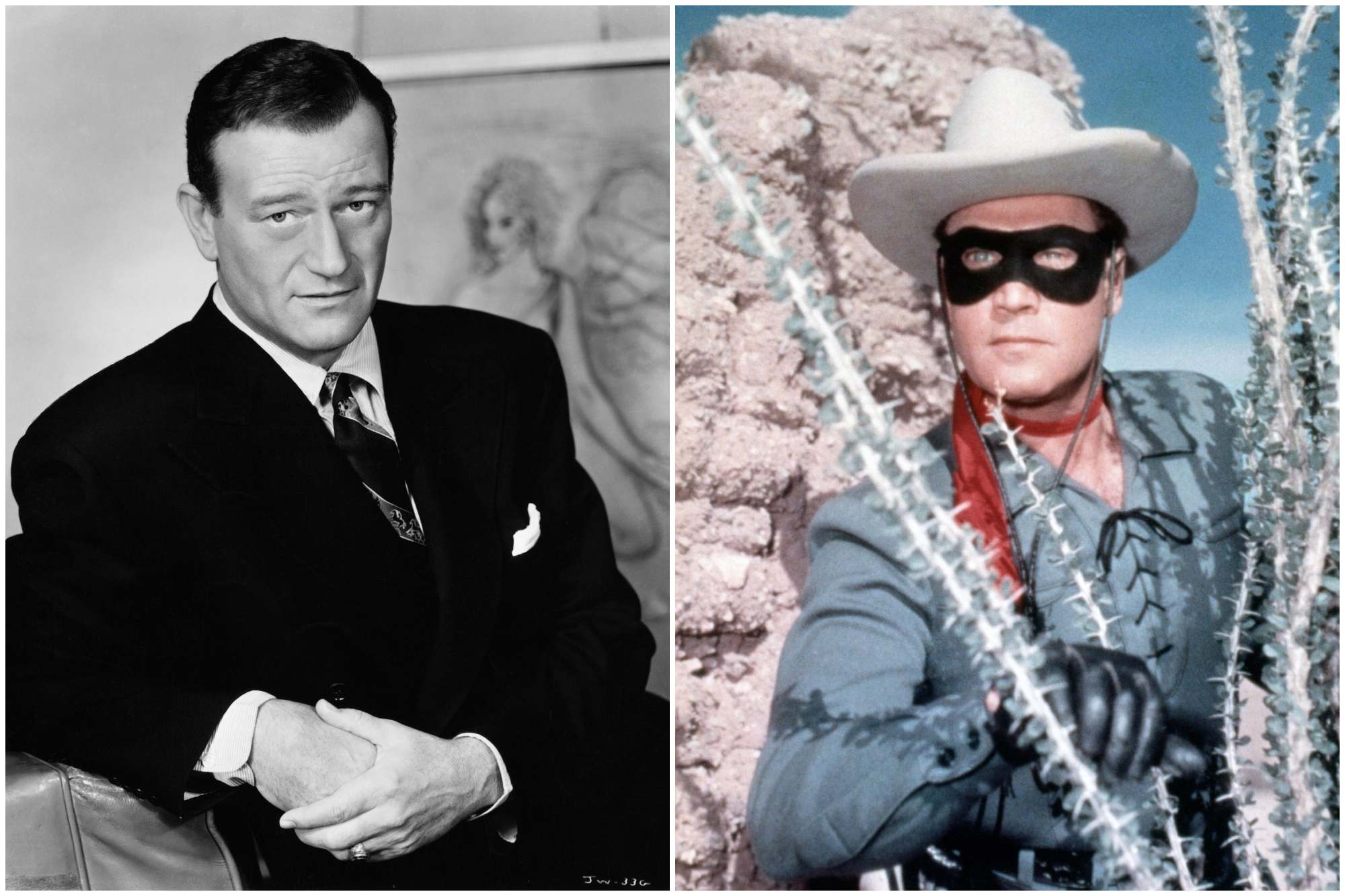Movie star John Wayne and The Lone Ranger actor Clayton Moore both held a strong foothold in the Western genre. One operated in film, while the other was recognized for his television appearance. Nevertheless, Wayne and Moore strongly agreed when it came to their criticisms of how Hollywood pushed entertainment to meet audience expectations.
John Wayne and Clayton Moore represented a Western era of the past

L-R: John Wayne and Clayton Moore as the Lone Ranger | John Springer Collection/CORBIS/Corbis via Getty Images, LMPC via Getty Images
Wayne first entered the scene when he started working in the props department on the Fox lot. It allowed him to cross paths with film directors, such as John Ford and Raoul Walsh. He earned his first leading role in 1930’s The Big Trail, which later granted him 1939’s Stagecoach. Wayne’s popularity went sky-high, becoming the face of the Western genre.
Meanwhile, Moore came from the world of modeling and acting. He occasionally played roles in B-movie Westerns. His performance in 1949’s Ghost of Zorro serial caught the attention of The Lone Ranger producer George W. Trendle. He played the iconic titular character to perfection alongside Jay Silverheels’ Tonto. Moore’s impact on the Western genre was undeniable.
John Wayne and Clayton Moore thought vulgarity was the end of Westerns
According to a 1979 interview with Moore, he thought that violence made the Western genre take a back seat. The popular genre finally started to lose its luster with audiences, which resulted in television networks and movie studios stopping to make that type of content. Well, Moore thought “blood and guts” in media had something to do with that.
“Well, first of all, there’s too much violence today,” Moore said. “We didn’t have a tremendous amount of violence on our shows. Sure, we did have the law of the gun, and we did have physical combat, fights, but there wasn’t the blood and guts as they call it today. I don’t like violence, I don’t think we have to have it. This is one of the reasons why I believe the Western has sort of taken a back seat.”
Moore continued: “However, it runs in cycles, and I think you’re going to find out that westerns will be coming back. It’s Americana, it’s part of our history, the cowboy, the cattle drive, the sheriff, the fight for law, order, and justice. Justice will always prevail as far as I’m concerned.”
Moore and Wayne saw eye-to-eye on this issue. The movie star hated the idea of a ratings system because he thought that all films should be family-friendly. Wayne didn’t agree with the public’s curiosity in seeing blood and guts, nor did he understand why they wanted so much vulgar language in their content.
Clint Eastwood represented the next generation
Wayne and Moore represented a more modest time in film and television. The next generation of talent looked up to these stars, even though they were taking storytelling to a more mature place. Actor Clint Eastwood did exactly that with the 1960s Dollars Trilogy – A Fistful of Dollars, For a Few Dollars More, and The Good, the Bad and the Ugly.
Eastwood played an anti-hero, incorporating more adult themes across the board. However, Wayne and Moore didn’t care for that evolution in storytelling. The movie star went as far as to shoot down the possibility of working with Eastwood, believing that he was insulting the Western genre that he spent much of his life working in.


 Entertainment10 months ago
Entertainment10 months ago
 Entertainment10 months ago
Entertainment10 months ago
 Entertainment11 months ago
Entertainment11 months ago
 Entertainment1 year ago
Entertainment1 year ago
 Entertainment10 months ago
Entertainment10 months ago
 Entertainment11 months ago
Entertainment11 months ago
 Entertainment11 months ago
Entertainment11 months ago
 Entertainment10 months ago
Entertainment10 months ago









